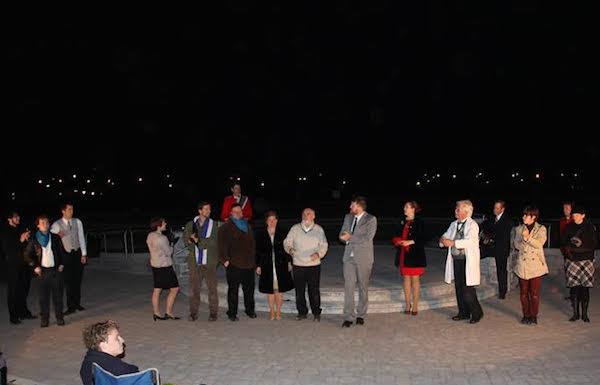
at the Open Hearth Park in Sydney, was a palpable hit.
On a dark, frosty night, under a waxing moon, at the threshold of a sleepy city, magic happened. Wheels of fortune turned, bastards rose and fell again, treachery shot out of wicked fingertips, madness seared the minds of great ones, and blindness triumphed as the straightest road to sight. This was the Bandshell Players’ story of King Lear, brought to life in Open Hearth Park in early October. It was among the finest theatrical productions I have seen since arriving in Sydney 18 months ago. The Bandshell Players’ production was well-cast and handsomely costumed. The location of the production was also well-chosen, as it benefitted abundantly from the heath-like backdrop of the park.
One of the aspects that stood out in this particular production of Lear was its bold reinterpretation of some of the characters and, indeed, a little piece of the plot. Edgar’s typically ardent filial piety was replaced with a man whose natural inclinations towards self-indulgence, demonstrated in Rory Andrews’ cocky demeanour in the early acts, was subdued into tragedy-evoked devotion. Andrews played this transition capably and broke the audience’s hearts with the incremental development of his character – particularly notable since this was Andrews’ stage debut.
Equally intrepid was the nod to earlier stories of Lear, cast aside by Shakespeare himself, in which we get a glimpse of Cordelia’s vitality. Just before the invisible curtain fell, the most devout daughter, played by a refulgent Kara Gulliver, sat bolt upright from her death-like state and gasped for life.
I was also pleased to see clear distinctions between Goneril and Regan, played by Jenna Lahey and Lindsay Thompson, respectively. So often, these wicked sisters are indistinguishable from one another –female versions of the equally treacherous Rosencrantz and Guildenstern. But, in the Bandshell Players’ production, these contemptible women were unmistakably different. Regan’s whiskey swilling belied a sweeter temperament than her zealous drinking implied. With her softer edge, she acted as a sort of foil to her ambitious sister, whose descent into unpalatable revenge against a love-hungry father was highlighted by Lahey’s skillful body language.
All three sisters’ costumes, designed by Claudette Babin, also highlighted aspects of their characters. Wealth dripped from their 1960s dress, reminding us in the audience of certain insulting but not always untrue links between wealth and greed. If greed can be interpreted as selfishness, then Cordelia’s finery might be indicative of the selfishness of a young woman who couldn’t tell her father what he wanted to hear, who valued honesty over affection to a lamentable fault. It was, after all, Cordelia’s refusal to assuage Lear’s fatal flaw – the blind need to be loved – that triggered the events that vaulted the characters towards their tragic demise.
This production adroitly handled a number of the staging challenges this play presents. For example, Edgar’s leading Gloucester, played convincingly by Ken Chisholm, over the cliffs of Dover ran smoothly and without incident. Likewise, the production overcame the challenge of the octogenarian Lear carrying Cordelia onto the stage in his arms by simply leaving it out. John Lingard, whose Lear was resolute and tragic, simply walked onto the platform while assistants brought Cordelia to lie downstage centre. Additionally, the fight scenes were deftly performed, directed by the masterly Todd Pettigrew.
A final lovely touch was the live music provided by Cyrus Orkish, Connor McLellan, and Matt Evans, at least two of whom were also celebrating their stage debuts. The melodies they provided added an element of sophistication and enjoyment that served to augment the evening’s delights. Directed by the very talented Mark Delaney and stage managed by the equally accomplished Amber Cragg and Kathleen O’Toole, King Lear was a palpable hit.

